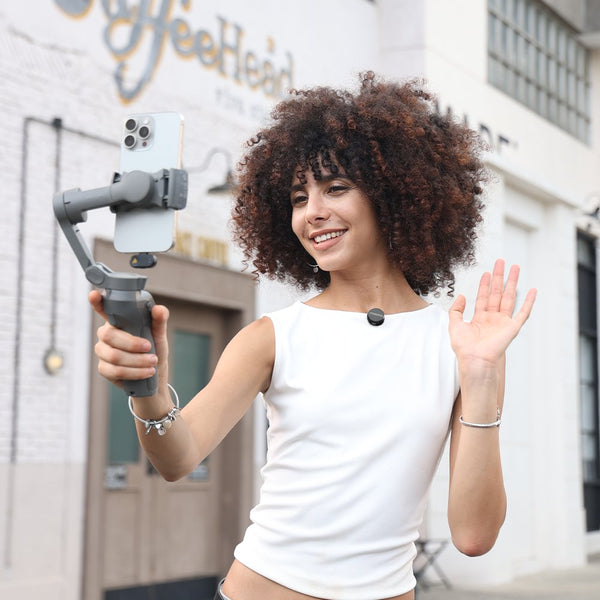When it comes to live singing, your microphone is just as important as your voice. Even the most talented performer can sound flat or muffled if the wrong mic is used on stage. Choosing the right gear ensures your audience hears every note with clarity and presence. But what exactly makes a good microphone for live vocals?
A good live vocal mic should deliver:
-
Clarity and accuracy without distortion, even at high volumes.
-
Durability to withstand the rigors of touring, stage drops, or heavy use.
-
Noise rejection, minimizing background sound from instruments and crowds.
-
Comfort and practicality, like lightweight handling or built-in features for easy control.
With these criteria in mind, let’s explore some of the best microphones for live singing that both beginners and professionals trust.
Top Choices for the Best Microphone for Live Singing
1. Maono HD300T
The Maono HD300T is a dynamic microphone for live singers designed with versatility in mind. It works well for both live singing and studio recording, making it an excellent affordable live vocal microphone for beginners.
Unique Features:
-
Dual output design: Offers both USB and XLR connectivity.
-
Zero-latency monitoring: Comes with a headphone jack and onboard volume control buttons, ensuring you can hear yourself in real time.
-
Durable construction: Metal body built to handle stage use.
Pros:
-
Great for beginners transitioning between home recording and live performance.
-
Clear, warm vocal tone.
-
Affordable compared to higher-end models.
Cons:
-
Lacks some of the nuanced detail of premium microphones.
-
Slightly bulkier than some handheld stage mics.
Why It’s Great for Live Singing:
With real-time monitoring, singers can instantly adjust their performance, staying in sync with the band. This makes the HD300T a top vocal mic for stage performance in smaller venues.
2. Maono PM500
The Maono PM500 is a large-diaphragm condenser mic engineered for clarity. It bridges the gap between an affordable live vocal microphone and a professional microphone for live vocals.
Unique Features:
-
Premium cardioid capsule that captures vocals with stunning detail.
-
Gold-plated diaphragm for smooth highs and rich mids.
-
Shock mount and pop filter included for reducing plosives and handling noise.
Pros:
-
Excellent clarity for live acoustic sets or intimate performances.
-
Professional build quality at an accessible price.
-
Captures subtle nuances in vocals.
Cons:
-
More sensitive to background noise compared to dynamic mics.
-
Requires phantom power, so a proper audio interface or mixer is necessary.
Why It’s Great for Live Singing:
Its sensitivity and detail make it ideal for acoustic sets, where vocal richness matters most. If you’re looking for the best microphone for live singing in small, controlled spaces, the PM500 is a strong contender.
3. Shure SM7B
The Shure SM7B is legendary. While often used in studios, it has a strong reputation as a professional microphone for live vocals, especially for performers who want warmth and natural sound.
Unique Features:
-
Wide frequency response for natural sound reproduction.
-
Excellent shielding against electromagnetic hum.
-
Smooth, flat, and warm sound ideal for vocals.
Pros:
-
Exceptional versatility—works for both live and recorded vocals.
-
Handles high sound pressure levels without distortion.
-
Trusted by professionals worldwide.
Cons:
-
Requires a lot of gain, so pairing it with a quality preamp or audio interface is essential.
-
Bulkier and heavier than standard handheld stage mics.
Why It’s Great for Live Singing:
Its background noise rejection makes it excellent in loud venues. Many call it a dynamic microphone for live singers who need consistency across different environments.
4. AKG C636
The AKG C636 is a top vocal mic for stage performance, built for touring professionals. It delivers studio-like clarity on stage, making it a favorite for singers who prioritize pristine sound.
Unique Features:
-
Handmade capsule with a gold-sputtered diaphragm.
-
Uniform cardioid pattern ensures consistent sound, even when moving off-axis.
-
Patented shock suspension system minimizes handling noise.
Pros:
-
Extremely clear and natural sound.
-
Robust build quality, designed for touring artists.
-
Superior feedback rejection.
Cons:
-
Pricier than most entry-level options.
-
Requires phantom power.
Why It’s Great for Live Singing:
It blends detail with durability, setting it apart as a professional microphone for live vocals.
5. Shure SM58
The iconic Shure SM58 is perhaps the most affordable live vocal microphone that also ranks as the best microphone for live singing for beginners. Its rugged build and reliability make it a staple in nearly every live venue.
Unique Features:
-
Dynamic cardioid microphone tailored for vocals.
-
Built-in spherical wind and pop filter.
-
Rugged steel mesh grille and construction.
Pros:
-
Affordable, reliable, and nearly indestructible.
-
Warm, clear vocal reproduction.
-
Excellent feedback rejection.
Cons:
-
Doesn’t capture the same detail as higher-end condensers.
-
Commonly used—so less “unique” in sound compared to boutique options.
Why It’s Great for Live Singing:
Trusted for decades, the SM58 proves that a dynamic microphone for live singers doesn’t have to be expensive to deliver warm, clear vocals.
6. Neumann KMS105
The Neumann KMS105 is a high-end professional microphone for live vocals known for its transparency and studio-level sound on stage.
Unique Features:
-
Supercardioid pattern for superior isolation.
-
Neumann capsule with exquisite detail and natural tone.
-
High SPL handling for powerful singers.
Pros:
-
Stunning clarity and transparency.
-
Low handling noise and excellent rejection of off-axis sounds.
-
Premium build with a sleek design.
Cons:
-
One of the most expensive handheld vocal mics.
-
Best suited for professional singers and controlled live environments.
Why It’s Great for Live Singing:
If you’re a touring professional who demands the best microphone for live singing, the KMS105 offers unmatched clarity and finesse.
How to Ensure Good Mic Placement During Live Singing
Even the best microphone for live singing won’t perform well if not positioned correctly.
Tips for placement:
-
Hold at chin level: Keep the mic around 1–2 inches away from your mouth.
-
Angle slightly off-axis: This reduces plosives and harsh “s” sounds.
-
Avoid cupping the grille: It causes distortion and feedback.
-
Adjust for dynamics: Move closer during softer passages and slightly back during powerful notes.
Proper technique ensures any dynamic microphone for live singers or condenser models delivers clean, consistent sound. Good mic technique not only improves sound quality but also reduces strain on your voice.
FAQ Section
1. What is a good microphone for live vocals?
A good microphone for live vocals is one that offers clarity, durability, and noise rejection. Popular choices include the Shure SM58 for budget-friendly reliability and the Neumann KMS105 for high-end performance.
2. Which mic is best for live vocals performance?
It depends on your needs. For beginners, the Shure SM58 or Maono HD300T is excellent. For professionals, the AKG C636 or Neumann KMS105 offers studio-level sound.
Final Thoughts
The right microphone can elevate your performance from average to unforgettable. Whether you’re just starting or performing on global stages, choosing a good microphone for live vocals is an investment in your artistry.
-
For affordable live vocal microphones, the Maono HD300T and Shure SM58 stand out.
-
For professional microphones for live vocals, the AKG C636 and Neumann KMS105 deliver world-class sound.
-
If you want a balance of both studio and stage performance, the Shure SM7B and Maono PM500 stand out.
Ultimately, the best mic for live singing is the one that complements your voice and performance style. With the right pick and proper placement, your vocals will shine in every performance.




